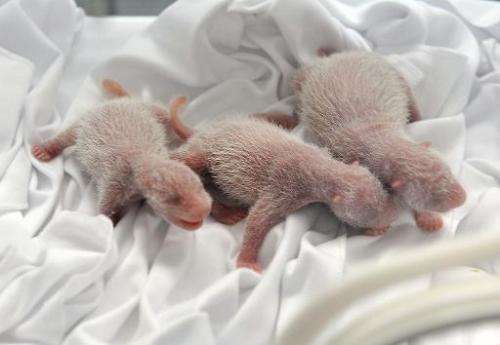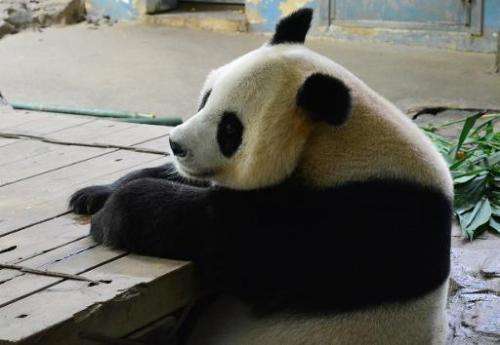Chinese zoo unveils world's 'first' surviving panda triplets (Update)

A Chinese zoo has unveiled newborn panda triplets billed as the world's first known surviving trio, in what it hailed as a "miracle" given the animal's famously low reproductive rate.
The mother panda, named Juxiao, meaning "chrysanthemum smile", delivered the triplets at Guangzhou's Chimelong Safari Park in the early hours of July 29, but was too exhausted to take care of them afterwards.
A video from the zoo showed Juxiao sitting in the corner of a room as she delivered her cubs for four gruelling hours and licking them after they were born. By the time it came to the delivery of the third cub, she was lying on her side out of exhaustion.
Her cubs were initially put into incubators while Juxiao regained her strength but had now been brought back to their mother for nursing and were being attended to by a round-the-clock team of feeders, the zoo said Tuesday.
"It was a miracle for us and (the births) exceeded our expectations," the safari park's general manager Dong Guixin told AFP.
"It's been 15 days. They have lived longer than any other triplets so far," Dong said.
An official from Sichuan Wolong National Nature Reserve, considered the foremost authority on pandas, said the trio were too young to be officially recognised as "surviving" but that they were the only known panda triplets alive.

"We can only say they are surviving once they reach six months. For now they are indeed the only surviving triplets," said an official from the centre who gave her name only as Ms. Zhao.
The cubs were naturally conceived when the 12-year-old Juxiao was paired with the 17-year-old father, Linlin, at the zoo, Dong said.
"In September last year, we made them neighbours so they could see each other and get familiarised with things such as smell. Juxiao also had to do more exercise to strengthen herself (for the pregnancy)," he said.
"The triplets can be described as a new wonder of the world," a statement from the safari park added, describing mortality rates among newborn pandas as "extremely high".
Pictures taken earlier this month of the triplets showed the pink-coloured cubs inside an incubator with their eyes closed and bodies thinly covered with white fur.
The zoo described them as being between 83 and 124 grams (2.9 and 4.4 ounces) and smaller than the size of a human palm at birth.
"The mother and babies were in good condition, but the adorable newborns were particularly inspiring," the zoo said.
The gender of the cubs cannot be determined until they grow older and they would be given their names at a later date.
The first known case of triplets from a giant panda was recorded in 1999, when a 15-year-old mother gave birth following artificial insemination in the southwestern Chinese city of Chengdu.
However the youngest of the trio died after living for just three days because of a bladder disorder.
Pandas, whose natural habitat lies in mountainous southwestern China, have a notoriously low reproductive rate and are under pressure from factors such as habitat loss. China has about 1,600 pandas living in the wild.
Their normal breeding season is mid-April to May.
© 2014 AFP





















